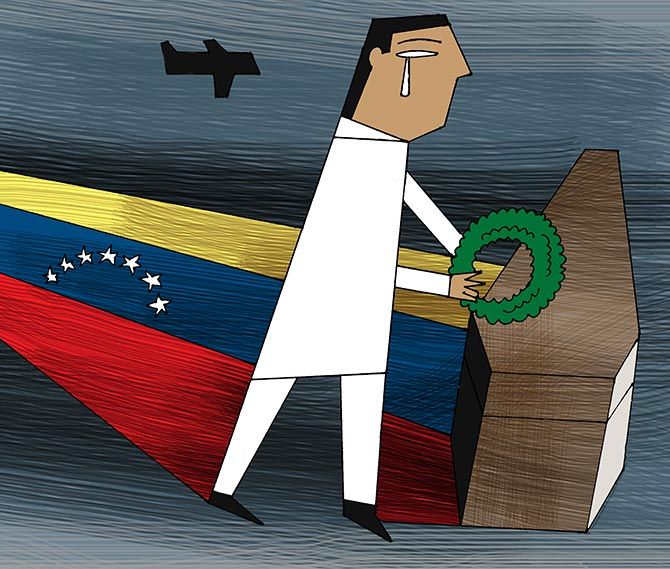'The phone rang on the night of January 15.'
'The voice of an Indian family friend in Venezuela came on.'
'That morning, there had been an accident on the highway'.
'My father had died on the spot.'
Radha Roy Biswas reveals her heart-warming and heart-breaking relation with a country drowning in economic chaos.
- Part 1: Venezuela: Before the Implosion
- Part 2: When Venezuela's star stopped shining

In 1985, I graduated from high school.
It was time to bid adios to this country and, in September of the year, I left Venezuela to attend college in India.
This was an inevitability I had always been prepared for, my sadness mitigated by two factors; most of my friends were also leaving and I knew I would come back for a visit.
My parents remained in Venezuela for another seven years, visiting my brother and me annually.
The fall of the economy was taking its toll on my dad. On his visits I could tell he was getting anxious about the future and he started making plans to return home, to Jamshedpur.
When I graduated from college in 1989, I made my last visit to Venezuela.
As per our plan, I would come back to India in two months to pursue my postgraduate work. My stay lasted a year.
I decided to defer my studies in India, and instead, spent nine months teaching conversational English at the Engineer's Institute in SIDOR.
That was my first paid gig, where I had the time of my life, teaching young-ish Venezuelan engineers (their machismo would never let them consider themselves middle-aged), the art of English.
I remember them looking a bit askance that a 21 year old from India would be teaching them, but once they learned that I had sort of grown up in Venezuela, and spoke fluent Spanish, they warmed up.
And anyway, all they really wanted to learn by way of conversational English was to learn how to flirt!
After a point, I realised I had unwittingly taken up a job as a translator.
Increasingly, they would come up at the end of the class, probably before a date, and ask, "Maestra! Lei esto en alguna parte. Que significa 'sweet nothings'? (Teacher, I read this somewhere. What does this mean, 'sweet nothings'?)" Or, "Maestra, How doo ju say thees? Yo suspiro por ti (I sigh for you)." And so it went, one sweet nothing after another.
A year later, I returned to India to join an advertising agency in Calcutta (now Kolkata).
In December 1992, my parents came home to India on a visit.
Watching them leave always left me anxious, but this time there was reason to be happy because my parents had set a timeline for their final return and retirement back home in Jamshedpur at the beginning of the following year.
They reached Venezuela on January 13, 1993. My dad called us to inform that they had arrived safely.
The phone rang again on the night of January 15.
The voice of an Indian family friend in Venezuela came on.
I was taken aback, but before I could think, the gentleman on the other side, a family friend, broke the news.
That morning, there had been an accident on the highway that connected our colony and the plant to the town.
My father had died on the spot.
Over the next few days, in the chaos and devastation that followed, my brother travelled to Venezuela to fetch my mother, who had to wind up her household of nearly 12 years in a week, as my father's death had invalidated her residency.
Venezuelan neighbours and colleagues, along with the Indian neighbours and friends community, came to pay their respects.
His death had been a shock, the first in the little expatriate community.
Winding up with the help of friends and neighbours, my mother and brother returned to India, with my father's embalmed remains in a coffin, for his final rites.
My personal loss was bigger than anything I had ever experienced, irreversible. But something else happened with my dad's passing. A cord was cut.
In my grief, I blocked off Venezuela.
Radha Roy Biswas, born in Jamshedpur, spent some cherished growing years in Puerto Ordaz Venezuela. A public policy researcher by training, she returned to Jamshedpur with her husband and daughter after 15 years in the USA. She consults occasionally in her field and devotes some time writing and teaching. She continues to be a keen observer of the developments in Venezuela.
- Part 4: The Nation That Crashed to Earth











 © 2025
© 2025